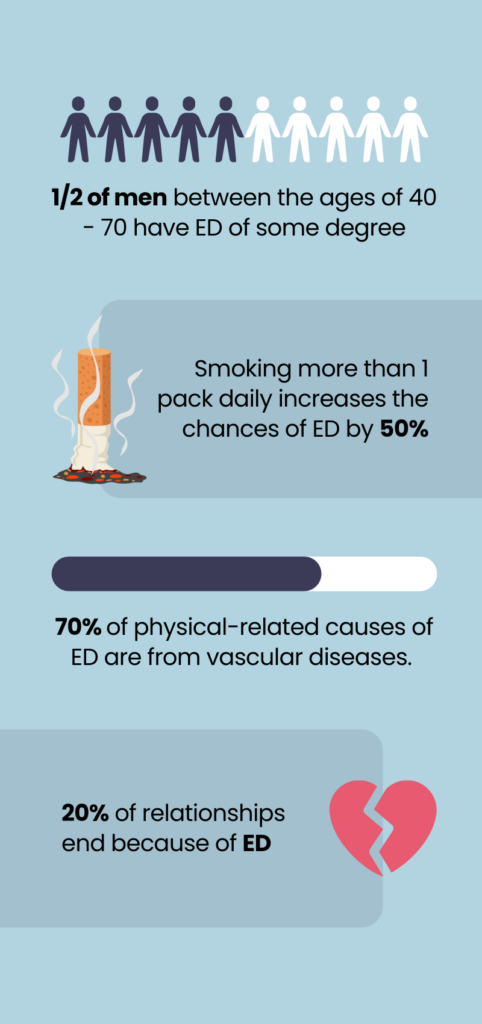
Erectile Dysfunction: Can It Be Cured
Table of Contents
Written by: Clara Hanson-Smith
Reviewed by: Sunny Dhain MPharmRS PgDip IndP
Date reviewed: 07/03/2024
Erectile Dysfunction is a condition that affects millions of men around the world; however, it is rarely spoken about in confidence. It’s a reality that many men, regardless of age, may face at some point in their lives.
While ED can be a challenging and sometimes frustrating issue to deal with, the good news is that there’s hope, in today’s blog we will cover all forms of treatment.
Erectile dysfunction remission in middle age and elderly men
A study performed by NIH “Predictors of sexual dysfunction incidence and remission in men” investigated the incidence and remission of erectile dysfunction (ED) and low sexual desire (SD) in middle-aged and elderly men.
Here are the key findings:
- The study investigated sexual dysfunction in middle-aged and elderly men.
- Key findings revealed that 23.2% of men had erectile dysfunction (ED) at baseline.
- Incidence, and remission rates for ED were 31.7% and 29.0%, respectively.
- Predictors (factors) of ED included higher age, lower income, higher abdominal fat, low alcohol intake, depression, and diabetes.
- Predictors (factors) of ED remission were lower age, current employment, and absence of certain health conditions.
- Factors affecting low sexual desire varied based on relationship status and lifestyle.
- Modifiable risk factors like physical activity, alcohol intake, and marital status influenced sexual dysfunction.
Overall, the study highlights the changing nature of sexual dysfunction in aging men and the importance of addressing lifestyle factors to prevent or improve it.
 Solutions to erectile dysfunction
Solutions to erectile dysfunction
Lifestyle modifications
- : Engaging in regular physical activity, such as those found in the Jack LaLanne workout routine, improves cardiovascular health, which is crucial for erectile function. Exercise also helps in maintaining a healthy weight and reducing stress.
- Healthy diet: A diet rich in fruits, vegetables, whole grains, and lean proteins can help improve ED by enhancing heart health and reducing obesity.
- Quitting smoking and limiting alcohol: Both smoking and excessive alcohol consumption are linked to ED. Quitting smoking and moderating alcohol intake can significantly improve erectile function.
- Stress management: Techniques such as mindfulness, meditation, and therapy can reduce stress and anxiety, addressing the psychological causes of ED.
Psychological and counselling support
- Therapy: For those whose ED is rooted in psychological factors, counselling or sex therapy can be highly effective. Couples therapy may also be beneficial in addressing relationship issues contributing to ED.
- Lifestyle Coaching: Professional guidance in making lifestyle changes can enhance the effectiveness of other treatments.
Alternative treatments
- Acupuncture: Some studies suggest that acupuncture can help in treating ED, though evidence is mixed.
- Herbal and natural remedies: Supplements such as ginseng and L-arginine have been explored for ED treatment, but it’s important to consult with a healthcare provider before trying these options, as they can interact with other medications.
Medical Treatments
- Phosphodiesterase type 5 inhibitors (PDE5 inhibitors): Drugs like sildenafil (Viagra), tadalafil (Cialis), and vardenafil (Levitra) increase blood flow to the penis, facilitating erections. These medications are effective for many men and are often the first line of treatment.
- Hormone Therapy: For men with hormonal imbalances, particularly low testosterone, hormone replacement therapy can be beneficial.
- Vacuum Erection Devices: These devices involve placing a tube over the penis, using a pump to create a vacuum that pulls blood into the penis, and then applying a ring at the base of the penis to maintain the erection.
- Surgery: In severe cases, surgical options such as penile implants or vascular surgery can be considered.
Factors that can cause erectile dysfunction
Physical health:
- Cardiovascular health: Conditions like hypertension, atherosclerosis (clogged arteries), and heart disease can restrict blood flow to the penis, making it difficult to achieve and maintain an erection.
- Diabetes: High blood sugar levels can damage blood vessels and nerves, leading to ED.
- Obesity: Being overweight or obese can increase the risk of ED due to hormonal changes and reduced blood flow.
Psychological factors:
- Stress and anxiety: High-stress levels, anxiety, or performance-related pressure can interfere with the brain’s signals to the penis, hindering erections.
- Depression: Mental health conditions, like depression, can affect libido and sexual function.
- Relationship issues: Problems in a relationship or unresolved conflicts can contribute to ED.
Lifestyle choices:
- Smoking: Smoking damages blood vessels and reduces blood flow, increasing the risk of ED.
- Alcohol and substance abuse: Excessive alcohol or drug use can impair sexual function and lead to ED.
- Diet: A poor diet high in saturated fats, sugars, and processed foods can contribute to obesity and cardiovascular problems, which are risk factors for ED.
- Physical Inactivity: Lack of exercise can lead to weight gain, poor circulation, and overall reduced sexual fitness.
Medications and treatments:
- Prescription medications: Some medications for high blood pressure, depression, and other conditions may have ED as a side effect.
- Prostate cancer treatments: Surgery or radiation therapy for prostate cancer can damage nerves and blood vessels involved in achieving an erection.
Hormonal imbalance:
- Low testosterone: A decrease in testosterone levels, often seen with age, can contribute to ED.
Neurological conditions:
- Conditions like multiple sclerosis, Parkinson’s disease, and spinal cord injuries can affect the nervous system’s ability to transmit signals to the penis.
Conclusion
It’s important to remember that ED is a treatable condition. Seeking help from The Family Chemist is the first step in finding an effective solution. Treatment options range from lifestyle modifications and psychological counselling to medications and medical procedures, depending on the underlying causes and individual circumstances.
Remember that you don’t have to face ED alone. Open and honest communication, along with a positive approach to addressing it, can significantly improve your quality of life and restore confidence in your sexual health.
Erectile dysfunction FAQs
What is the main cause of erectile dysfunction
- Physical factors: These can include cardiovascular issues (such as high blood pressure or atherosclerosis), diabetes, obesity, hormonal, drug use, lack of exercise, and poor diet can contribute to ED.
- Age: ED becomes more common as men get older, but it’s not an inevitable part of ageing.
How do you fix ED?
- Lifestyle changes: For some men, making healthier lifestyle choices can improve ED. This may include exercise, a balanced diet, reducing alcohol consumption, quitting smoking, and stress management.
- Medications: There are several prescription medications available to treat erectile dysfunction, such as Viagra (sildenafil), Cialis (tadalafil), and Levitra (vardenafil). These drugs work by increasing blood flow to the penis, helping to achieve and maintain an erection.
- Hormone therapy: If low testosterone levels are contributing to ED, hormone replacement therapy may be an option.
Can a man with erectile dysfunction satisfy a woman?
As for satisfying a partner, it’s entirely possible for a man with ED to satisfy a woman sexually. Communication, emotional connection, and intimacy are essential aspects of a fulfilling sexual relationship. Many couples find ways to enjoy physical intimacy and pleasure even when ED is present. Additionally, there are various aids and techniques available to enhance sexual experiences for couples dealing with ED.
How can you tell if a man has erectile dysfunction?
- Inability to achieve or maintain an erection: The primary symptom of ED is the consistent inability to achieve or sustain an erection that is firm enough for sexual intercourse. Occasional difficulty with erections is not necessarily a sign of ED, but if it becomes a persistent issue, it may indicate a problem.
- Difficulty with spontaneous erections: Healthy men typically experience spontaneous erections during sexual arousal or upon waking in the morning. A man with ED may notice a lack of these spontaneous erections.
- Reduced sexual desire: While ED primarily relates to difficulties with achieving or maintaining an erection, some men with ED may also experience a decrease in sexual desire or libido.
- Stress and anxiety: ED can lead to stress and anxiety, both related to sexual performance and overall well-being. These psychological factors can exacerbate the condition and create a cycle of performance anxiety.
- Relationship strain: Persistent ED can strain intimate relationships, leading to communication problems, frustration, and emotional distance between partners.




